
Chester Arthur Burnett, better known by his stage name Howlin' Wolf, was an American blues singer, guitarist and harmonica player. He was at the forefront of transforming acoustic Delta blues into electric Chicago blues, and over a four-decade career, recorded blues, rhythm and blues, rock and roll, and psychedelic rock. He is regarded as one of the most influential blues musicians of all time.
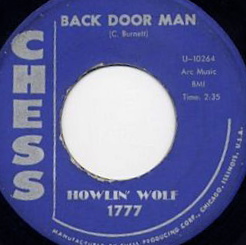
"Back Door Man" is a blues song written by American musician Willie Dixon and recorded by Howlin' Wolf in 1960. The lyrics draw on a Southern U.S. cultural term for an extramarital affair. The song is one of several Dixon-Wolf songs that became popular among rock musicians, including the Doors who recorded it for their 1967 self-titled debut album.

Moanin' in the Moonlight is a compilation album and the first album by American blues artist Howlin' Wolf, released by Chess Records in 1959. It contains songs recorded between 1951 and 1959 previously issued as singles, including one of his best-known, "Smokestack Lightning". Rolling Stone ranked it number 477 on its 2020 list of "the 500 Greatest Albums of All Time".
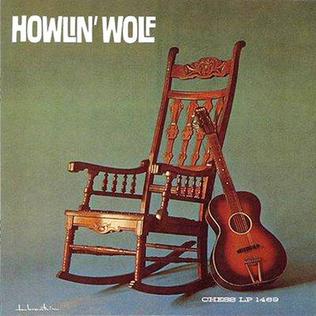
Howlin' Wolf is the second album from the Chicago blues singer/guitarist/harmonicist, Howlin' Wolf. Released in 1962, it is a collection of twelve Chess singles that they previously released between June, 1957 and December, 1961. Because of the illustration on its sleeve, the album is often called The Rockin' Chair Album, a nickname even added to the cover on some reissue pressings of the LP.

Blues Jam in Chicago is a studio recording by the British rock band Fleetwood Mac, originally released in two single-LP volumes by Blue Horizon in December 1969. It was the result of a recording session in early 1969 at Chess Records in Chicago with Fleetwood Mac, then a young British blues band, and a number of famous Chicago blues artists from whom they drew inspiration. The album has also been released, with slightly different track listings, under the titles Blues Jam at Chess Volumes One and Two and Fleetwood Mac in Chicago, the latter by Sire Records in 1976.
John Thomas Brown was an American tenor saxophonist of the Chicago blues era. He was variously billed as Saxman Brown, J. T. Brown, Bep Brown, Nature Boy Brown and J.T. "Blow It" Brown.
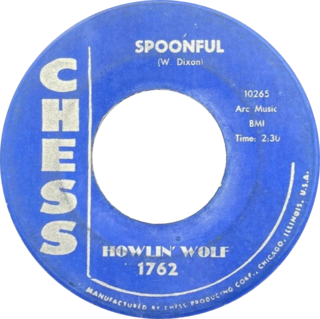
"Spoonful" is a blues song written by Willie Dixon and first recorded in 1960 by Howlin' Wolf. Called "a stark and haunting work", it is one of Dixon's best known and most interpreted songs. Etta James and Harvey Fuqua had a pop and R&B record chart hit with their duet cover of "Spoonful" in 1961, and it was popularized in the late 1960s by the British rock group Cream.

The London Howlin' Wolf Sessions is an album by blues musician Howlin' Wolf released in 1971 on Chess Records, and on Rolling Stones Records in Britain. It was one of the first super session blues albums, setting a blues master among famous musicians from the second generation of rock and roll, in this case Eric Clapton, Steve Winwood, Charlie Watts, and Bill Wyman. It peaked at #79 on the Billboard 200.
"Wang Dang Doodle" is a blues song written by Willie Dixon. Music critic Mike Rowe calls it a party song in an urban style with its massive, rolling, exciting beat. It was first recorded by Howlin' Wolf in 1960 and released by Chess Records in 1961. In 1965, Dixon and Leonard Chess persuaded Koko Taylor to record it for Checker Records, a Chess subsidiary. Taylor's rendition quickly became a hit, reaching number thirteen on the Billboard R&B chart and number 58 on the pop chart. "Wang Dang Doodle" became a blues standard and has been recorded by various artists. Taylor's version was added to the United States National Recording Registry in 2023.

"Little Red Rooster" is a blues standard credited to arranger and songwriter Willie Dixon. The song was first recorded in 1961 by American blues musician Howlin' Wolf in the Chicago blues style. His vocal and slide guitar playing are key elements of the song. It is rooted in the Delta blues tradition and the theme is derived from folklore. Musical antecedents to "Little Red Rooster" appear in earlier songs by blues artists Charlie Patton and Memphis Minnie.

I Am the Blues is the sixth studio Chicago blues album released in 1970 by the well-known bluesman Willie Dixon. It is also the title of Dixon's autobiography, edited by Don Snowden.
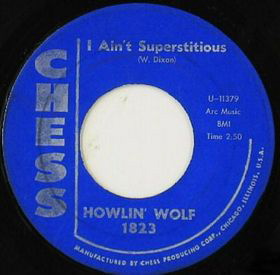
"I Ain't Superstitious" is a song written by bluesman Willie Dixon and first recorded by Howlin' Wolf in 1961. It recounts various superstitions, including that of a black cat crossing the pathway. The song has been recorded by a number of artists, including Jeff Beck, whose blues rock adaptation in 1968 was named one of Rolling Stone magazine's "100 Greatest Guitar Songs of All Time".

"Evil", sometimes listed as "Evil (Is Going On)", is a Chicago blues song written by Willie Dixon. Howlin' Wolf recorded the song in Chicago for Chess Records in 1954. It was included on the 1959 compilation album Moanin' in the Moonlight. When he re-recorded it for The Howlin' Wolf Album in 1969, "Evil" became Wolf's last charting single, reaching number 43 Billboard R&B chart.

Lafayette Leake was an American blues and jazz pianist, organist, vocalist and composer who played for Chess Records as a session musician, and as a member of the Big Three Trio, during the formative years of Chicago blues. He played piano on many of Chuck Berry's recordings.
Joseph Leon "Jody" Williams was an American blues guitarist and singer. His singular guitar playing, marked by flamboyant string-bending, imaginative chord voicings and a distinctive tone, was influential in the Chicago blues scene of the 1950s.

Eddie Shaw was an American Chicago blues tenor saxophonist, arranger and bandleader. He led Howlin' Wolf's band, the Wolf Gang, from 1972, both before Wolf's death in 1976 and subsequently.
Otis "Big Smokey" Smothers was a Chicago blues guitarist and singer. He was a member of Howlin' Wolf's backing band and worked with Muddy Waters, Jimmy Rogers, Bo Diddley, Ike Turner, J. T. Brown, Freddie King, Little Johnny Jones, Little Walter, and Willie Dixon. His younger brother, Abe, was the bluesman Little Smokey Smothers, with whom he is sometimes confused.

His Best is a greatest hits album by American blues musician Howlin' Wolf. The album was originally released on April 8, 1997, by MCA/Chess Records, and was one of a series of releases by MCA for the 50th anniversary of Chess Records that year. Ten years later – on April 17, 2007 – the album was reissued by Geffen Records as The Definitive Collection.

The Real Folk Blues is an album by blues musician Sonny Boy Williamson II compiling songs recorded in Chicago between 1957 and 1964. Released by Chess Records in 1966, the album contains mostly previously unissued material, including "Checkin' Up on My Baby" and "Bring It On Home", which have been called "some of the most accomplished masterpieces of postwar blues".
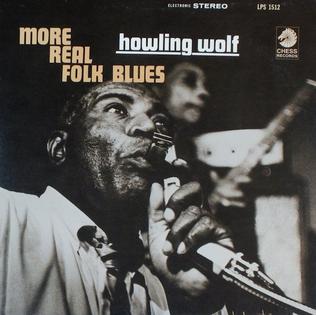
More Real Folk Blues is a compilation album by blues musician Howlin' Wolf, released by Chess Records in 1967. It includes songs that were recorded in Memphis and Chicago between 1953 and 1956.
















